Understanding how Google AI Overviews Impact SEO can give you a distinct competitive edge. In this article, we will explore the evolution of Google’s AI, its core principles, and how you can adapt your content and technical strategies for maximum visibility.
What Are Google AI Overviews?
Google AI Overviews represent the brief explanations and summaries that Google’s artificial intelligence systems generate to understand content, user queries, and overall search trends. The reason this topic is so important to modern SEO is that these overviews influence search results in a way that goes well past simple keyword matching. Instead, AI engines gauge context, intent, and user experience, which in the end shapes how content ranks on results pages.
Google AI Search Has Evolved
In earlier years, search engines primarily counted keywords on a page to decide its relevance. This approach led to keyword stuffing and an abundance of low-quality web pages. Google’s algorithm updates, particularly Hummingbird, marked a significant turning point. Semantic search began emphasising user intent over keyword frequency. Today, Google AI Overviews consider synonyms, contexts, and user signals to rank pages, reinforcing the importance of quality content and in-depth topic coverage.
Natural Language Processing and Search Context
NLP, also known as natural language processing, is one of the principal drivers of this evolution. Introduced with systems like BERT(external link) (Bidirectional Encoder Representations from Transformers), NLP allows Google to interpret the subtleties of user queries. BERT helps the search engine decipher complex sentence structures and better match user intent with relevant web pages. MUM(external link) (Multitask Unified Model) goes even further, analysing images, text, and videos to provide comprehensive results. These breakthroughs in NLP illustrate how google AI overviews impact your SEO strategy by rewarding websites that address queries holistically, use natural language, and adapt content to a variety of mediums.
Core Principles of AI Search
AI search focuses on understanding intent, context, and synonyms. Simply repeating a target keyword is no longer sufficient. Google assess how well your content matches user questions, employing vast amounts of data to measure relevance. This means context-rich writing, user-focused headings, and well-structured pages can outperform content that merely repeats keywords. By aligning your writing to the deeper purpose behind user queries, you can bolster organic visibility and strengthen your site’s authority.
User Experience and Search Intent
User signals such as click-through rates and pages per session are crucial for Google AI Overviews. If visitors spend little time on your site or immediately bounce back to search results, Google’s AI interprets this behaviour as a negative user experience. On the other hand, longer dwell times and higher engagement suggest your content satisfies user intent. This feedback loop enables AI algorithms to adjust rankings in real time, highlighting the necessity for quality, engaging content. When you combine content with a user-friendly interface, you meet both user intent and the AI’s criteria for high-value pages.
How Google AI Overviews Influence SEO Strategy
When viewing how google AI overviews can impact your SEO strategy, it is important to consider practical optimisation techniques. Through voice search, structured data, and comprehensive topic coverage, AI influences nearly every aspect of SEO today.
Optimising for Conversational Queries
Voice search powered by AI has increased in popularity, prompting a shift towards conversational queries. Phrases like "Does Google Ads Charge GST? " exemplify the long-tail approach. Integrating natural language within your content, FAQs, and headers aligns perfectly with AI’s tendency to interpret user intent. The more closely your content mirrors everyday speech, the more likely it will match AI-driven searches and appear in prominent SERP features.
Enhancing Content Depth and Quality
AI favours websites that demonstrate topic authority rather than offering superficial coverage. Publishing in-depth articles that address related subtopics and user questions is crucial. Google’s AI Overviews assess how thoroughly you explore a subject, whether it’s Google Ads or upcoming SEO trends. By providing exhaustive insights, complete with data, examples, and relevant references - you can climb SERPs more effectively than competitors who only skim the surface.
Structured Data & Rich Snippets
By embedding schema markup, you help Google’s systems extract essential information and present it in rich snippets, featured snippets, or knowledge panels. If you optimise for ''How to use Google Ads'' using structured data, you increase the likelihood of ranking for quick answers or tabular data in SERPs. This enhanced visibility not only drives immediate clicks but also builds topical relevance.
Taking Advantage of AI-Powered SERP Features
Modern SERPs incorporate AI elements, from ‘’People Also Ask’’ boxes to Knowledge Graph panels, and understanding how to leverage these features is integral to success.
People Also Ask and Related Searches
People Also Ask (PAA) boxes are generated by AI to address related queries that users frequently search. By covering these secondary topics in your content, you enhance the chance of appearing in multiple PAA boxes. Similarly, Related Searches at the bottom of Google’s results page often include variations of your primary keyword or synonyms. Monitoring and incorporating these suggestions can strengthen your SEO. Since Google AI Overviews continue to evolve, capturing PAA and Related Searches spots can drastically improve click-through rates and brand visibility.
Practical Strategies to Stay Ahead
Adapting to AI means refining both on-page content and technical SEO elements. Below are some strategies to sustain SEO performance amidst these developments.
Enhancing Technical SEO for AI
A fast, secure, and mobile-friendly site underpins every successful SEO campaign. Clean coding practices, optimised images, and quick load times are vital signals. Efficient site architecture and consistent internal linking also enable AI to crawl and index content more effectively. Google’s algorithm rewards these elements, elevating pages that demonstrate an exceptional user experience.
Creating Topic Clusters
Topic clusters are an excellent method for organising content around core themes. This approach strengthens your site’s authority on each subject. Start by creating a cornerstone article that covers the main topic in depth, and then develop supporting articles that branch off into subtopics. Interlink them strategically to guide crawlers and users through your site’s content. Google AI Overviews interpret this structure as a cohesive knowledge base, boosting your credibility.
Considering AI's Contextual Keyword Approach
Keyword research today must account for AI’s contextual approach. Tools that analyse user intent, question-based phrases, and semantic variations are particularly valuable. Rather than fixating on one rigid keyword, consider how queries evolve. Searching for related terms—like ''When to use Google Ads?'' in conjunction with “Best Practices for Google Ads”—broadens your visibility. Incorporating question-based queries serves voice searches and conversational AI, ensuring your content ranks well in multiple contexts.
Personalised Search and Data Privacy
AI tailors search results to individual users based on location, search history, and other signals. While personalisation enhances relevance, it also raises data privacy issues. Marketers must walk a fine line between offering customised experiences and respecting user preferences. As Google refines its AI Overviews, personalisation could grow more sophisticated, impacting how often your content appears in specific user segments. Maintaining transparency about data usage and consent will be vital for long-term credibility and compliance.
Conclusion
From NLP breakthroughs like BERT and MUM to AI-driven SERP features such as Featured Snippets and People Also Ask, Google’s emphasis on context and user satisfaction has never been greater. Consequently, ensuring your content is both informative and engaging will help you navigate AI’s stringent quality checks. Alongside strong technical SEO and strategic keyword research, aligning your on-page optimisation with user intent is the most effective way to harness the power of Google AI Overviews and maintain strong search visibility. Reach out to Somar Digital to see how we can help




